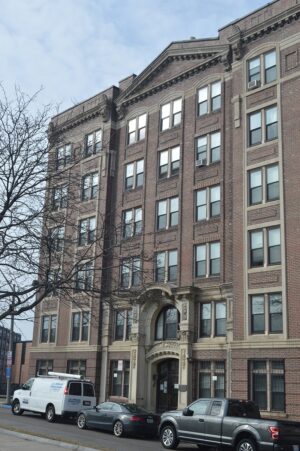
The Archdiocese of Boston’s nonprofit housing arm and Fenway Community Development Corp. will preserve affordable units following their acquisition of the Our Lady’s Guild House at 20 Charlesgate West. Photo courtesy of Our Lady’s Guild House Restoration Coalition
Greater Boston continues to fall short in providing an adequate stock of affordable housing. As rental rates continue to rise, more households find themselves rent- burdened, therefore it is critical that we not only increase supply but also preserve the critical stock of existing affordable housing.
When the opportunity presents itself to preserve what is often referred to as naturally occurring affordable housing, that is a win for our city and the region, and that’s exactly what happened with the sale of 20 Charlesgate West, the former Our Lady’s Guild House.
Previously owned by the Daughters of Mary of the Immaculate Conception, a religious order based in Connecticut who controlled the property for over 70 years, 20 Charlesgate was marketed for sale by Colliers and successfully changed hands in October.
The 6-story, 140-unit rooming house located in Boston’s Fenway neighborhood sold for $14 million to the Archdiocese of Boston’s Planning Office for Urban Affairs and Fenway Community Development Corp. with the city of Boston’s Mayor’s Office of Housing and Community Economic Development Assistance Corp. funding the acquisition.
How Deal Came to Be
The seller had historically charged well-below-market rents to their single-room occupancy tenants, generally single adults as well as students from Boston’s expansive college and university landscape. Their need to sell the building at a market value to an owner who would continue their charitable mission of providing affordable housing was an assignment that aligned well with Colliers and my background.
Having joined Colliers in 2021 and worked in the field of affordable housing for over 30 years, most recently as CEO of Madison Park Development Corp., I maintain strong relationships with the potential owners that I envisioned being able to acquire the property, subject to affordability restrictions. We provided advice to the client regarding asset valuation and positioned the asset for sale to achieve competitive bids at a market price, and understood the public charities laws governing this transaction.
Knowing the Massachusetts attorney general’s office was charged with the review of the sale and distribution of surplus proceeds, I designed a process that highlighted the key attributes of the property, but disclosed the affordability restrictions and conducted an extensive sales process reaching out to developers of affordable housing in the market.
That process resulted in a great number of competitive bids by local for-profit and nonprofit organizations with relevant track records. I counseled the board as they interviewed prospective buyers and selected the joint venture of the Planning Office for Urban Affairs and Fenway CDC.
The experienced development team plans to completely renovate and modernize the property to house low-income residents in 78 supportive rental units, including 19 enhanced single-room occupancy units, 44 studios and 15 one-bedroom apartments. Subject to federal relocation laws, existing tenants are ensured relocation assistance during construction and the right to return upon completion. This is the perfect example of an opportunity to preserve this critical housing in a neighborhood with excellent access to public transit and amenities.

Jeanne Pinado
Market Limit Renters’ Options
In terms of the market outlook, apartment market fundamentals do not bode well for the affordability crisis. In fact, market conditions could move further in favor of landlords.
On the demand side, increased hurdles to homeownership, including low inventory, high prices and elevated mortgage rates are locking in increasing numbers of renters. The number of multifamily rental units underway has decreased by more than 20 percent since midyear 2022. If apartment completions continue to outpace starts, renters’ options will become increasingly limited.
With apartment vacancies remaining healthy compared to their 10-year average, relatively firm fundamentals should limit downward pressure on rents. In fact, The Boston Foundation’s 2023 Greater Boston Housing Report Card determined that rents have risen in all ZIP codes across the metro for which data was available in recent years. The study also found that the Boston metropolitan statistical area has the fourth-highest rents among the 50 largest metros in the country.
Jeanne Pinado is executive vice president at Colliers in Boston.




 |
| 

